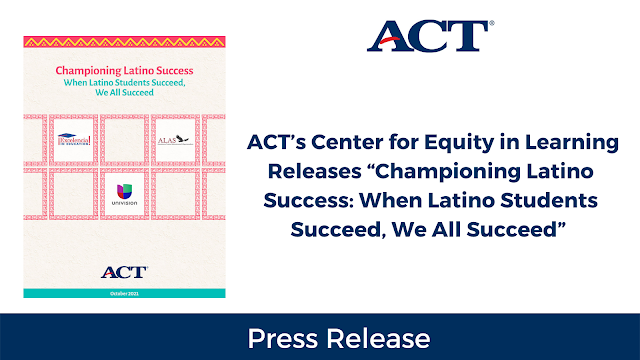IOWA CITY, Iowa — ACT’s Center for Equity in Learning is proud to work alongside Latino education advocacy organizations and the student populations they serve. The Center is highlighting these efforts in “Championing Latino Success: When Latino Students Succeed, We All Succeed,” and with a webinar November 16 at 4:00 p.m., ET.
For many years, ACT has been identifying and addressing challenges and issues facing Latino student success in education and work. ACT’s commitment to Latino Student Success is anchored to its mission, including more than 10 years of actively supported efforts to ensure that all Latino students have equitable opportunities to thrive. A key element of these efforts includes engaging and collaborating alongside organizations that have a long history of work in the area of improving Latino student success.
ACT CEO Janet Godwin says, “We are very proud to support, collaborate with, and learn from the Association of Latino Administrators and Superintendents, Excelencia in Education, and Univision. They share ACT’s lived value of helping all people achieve education and workplace success. We have much more to do—and we are eager to work alongside other organizations and leaders like these.”
The new report highlights ACT’s history of collaborating with the following organizations to accelerate student success in higher education; build K–12 leadership capacity; and engage students, families, and communities.
Association of Latino Administrators and Superintendents (ALAS)
ALAS is developing an exemplary cadre of K–12 superintendents and administrators who are highly prepared to lead districts toward equity, excellence, and achievement for all students, with an emphasis on marginalized students. As a long-time executive sponsor of ALAS, ACT collaborates closely with the association.
ACT leaders and staff support the Superintendents Leadership Academy; they attend and make presentations on equity and the Latino student experience for the SLA with a focus on improving Latino student outcomes.
Excelencia in Education
Excelencia in Education accelerates Latino success in higher education—and mobilizes, supports, and recognizes higher education institutions that intentionally serve Latino students and demonstrate positive outcomes. ACT has collaborated with Excelencia for more than a decade in support of Examples of Excelencia, the only national data-driven initiative to recognize programs at the associate, baccalaureate, and graduate levels as well as community-based organizations with evidence of effectiveness in accelerating Latino student success.
ACT also has collaborated with Excelencia on the growth of its Growing What Works Database, which makes the Examples of Excelencia freely and publicly available.
Univision
Univision is engaging Latino students, families, and communities with back-to-school campaigns, education fairs, parent workshops, videos, and on social media to promote the importance of college and provide expertise and resources to help students to get there. For years, the company has teamed up with ACT, higher education institutions, and community organizations to host Ferias de Educación (education fairs) around the country. The fairs, which are part of Univision’s Regresa a Classes (back-to-school) campaign, are among the largest such gatherings in the nation and are free for parents, students, and educators.
“We understand that we are not the experts in this subject,” says Claudia Bojorquez, former director of strategic partnerships, Corporate Social Responsibility, Univision. “The people at ACT are the subject [matter] experts. We rely on their information and resources to provide this information to our audience. Partnering with ACT to help us create and facilitate these workshops is a huge help. Very few people can actually conduct these workshops. We wouldn’t be able to do this without them.”
Additional Work
ACT’s intentional work championing Latino success also involves collaborating with Texas A&M International University’s School of Education, which aims to increase the number of high-quality Latino teachers entering the pipeline, address teacher shortages, and diversify the teaching workforce. This relationship will serve as a model for teacher preparation programs nationwide.
In addition, as part of a longstanding collaboration with Region One Education Service Center in South Texas, ACT researchers are examining the factors that facilitate the acquisition of social and emotional learning (SEL) skills—including program efficacy, program implementation, and family engagement—and the role that SEL skills play on the college, career, and life readiness of Latino students. For examples of this research, see here.
A webinar will be held Tuesday, November 16 at 4 p.m., ET featuring a panel of organization leaders from the Association of Latino Administrators and Superintendents (ALAS) and Excelencia in Education who will highlight their programs and initiatives which are demonstrating support of Latino student success. Register here.
About ACT’s Center for Equity in Learning
ACT’s Center for Equity in Learning focuses on closing gaps in equity, opportunity, and achievement for underserved populations and working learners. Through purposeful investments, employee engagement, and thoughtful advocacy efforts, the Center supports innovative partnerships, actionable research, initiatives, campaigns, and programs to further ACT’s mission of helping people achieve education and workplace success. http://equityinlearning.act.org/
Adam Shapiro
202-427-3603
Adam.Shapiro@ASPR.bz

